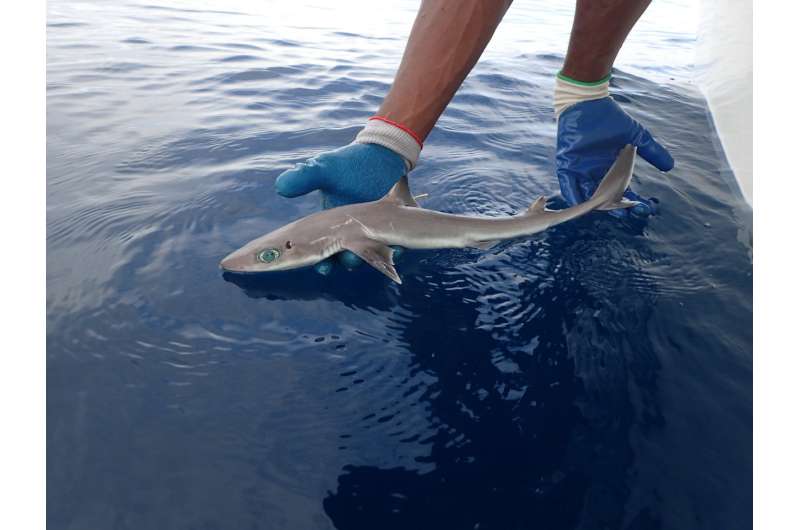Newly discovered shark species honors female pioneer

Eugenie Clark was a pioneer in shark biology, known around the world for her illuminating research on shark behavior. But she was a pioneer in another critical way, as one of the first women of prominence in the male-dominated field of marine biology.
Fondly labeled the "Shark Lady," Clark, who founded Mote Marine Laboratory and continued studying fishes until she passed away in 2015 at age 92, will now be recognized with another distinction: namesake of a newly discovered species of dogfish shark.
The species, named Squalus clarkae, also known as Genie's Dogfish, was identified from the Gulf of Mexico and western Atlantic Ocean. The confirmation of this new species was reported this month in the journal Zootaxa. The article can be found here.
Florida Institute of Technology assistant professor and shark biologist Toby Daly-Engel was among the paper's four author's, along with marine scientists Mariah Pfleger of Oceana, the lead author and Daly-Engel's former graduate student, and Florida State University's Dean Grubbs and Chip Cotton.
Before their findings, researchers labeled this species of dogfish shark Squalus mitsukurii. However, using new genetic testing and morphology, the study of an organism through physical appearance, they discovered and classified Genie's Dogfish as a new species.
"Deep-sea sharks are all shaped by similar evolutionary pressure, so they end up looking a lot alike," Daly-Engel said. "So we rely on DNA to tell us how long a species has been on its own, evolutionarily, and how different it is."
"This type of research is essential to the conservation and management of sharks, which currently face a multitude of threats, from overfishing and bycatch, to the global shark fin trade," added Pfleger, marine scientist for the responsible fishing and sharks campaigns at Oceana. "Many fisheries around the world are starting to fish in deeper and deeper waters and unfortunately, much less is known about many of the creatures that live in the deep. The first step to successfully conserving these species that live in deeper waters, like Genie's Dogfish, is finding out what is down there in the first place."
For Daly-Engel, the discovery goes beyond science.
At an early age, she was drawn to Clark and her books. As Daly-Engel advanced in her career, she saw Clark's impact as one of the early members of the American Elasmobranch Society, a group Daly-Engel later joined and through which she met Clark.
"She is the mother of us all," Daly-Engel said. "She was not just the first female shark biologist, she was one of the first people to study sharks."
The feeling rings true for Pfleger, as well. "Dr. Clark was a trailblazer for women in shark biology. Her work showed me that it was possible to make my mark in a male-dominated field. This paper is a perfect example of how her career has influenced multiple generations of women in science: the first author is a woman who graduated from a woman-led lab."

"Genie was aptly nicknamed the 'Shark Lady' because her shark research was so innovative and she was dedicated to teaching the truth about sharks," said Robert Hueter, Ph.D., director of the Center for Shark Research at Mote. "Not only was she responsible for establishing Mote's legacy of more than 60 years in shark research, but also, her discoveries inspired people around the world to develop a sense of eagerness and passion for understanding and ultimately protecting these fascinating animals."
As founding director of Mote Marine Laboratory, Clark was very familiar with the Gulf of Mexico. For a trailblazer in the world of shark biology, it is fitting that the new species of shark would be named after her, Daly-Engel said.
"Genie established Mote and she lived on the Gulf of Mexico coast," she said. "She did a lot to advance our understanding of marine biodiversity there. So naming the dogfish shark from the Gulf of Mexico after her is the most appropriate thing in the world."
More information: MARIAH O. PFLEGER et al, Squalus clarkae sp. nov., a new dogfish shark from the Northwest Atlantic and Gulf of Mexico, with comments on the Squalus mitsukurii species complex, Zootaxa (2018). DOI: 10.11646/zootaxa.4444.2.1
Journal information: Zootaxa
Provided by Florida Institute of Technology

















